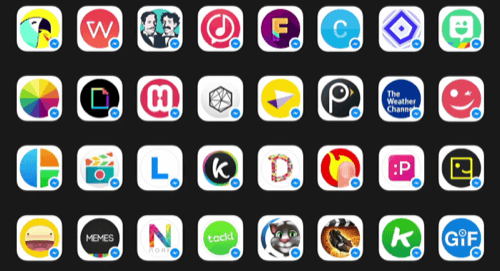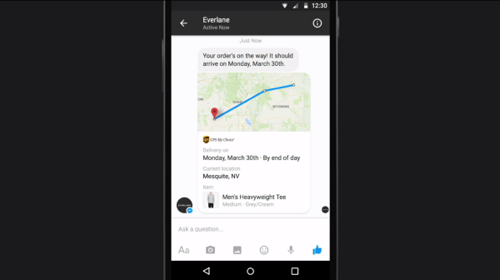
Facebook’s Messenger app has some big ambitions. It not only wants to give users new ways to communicate via goofy photos, GIFs, video and eventually virtual-reality recordings, it’s also making a big play for e-commerce.
No wonder Facebook now calls it the Messenger Platform, as it announced at its F8 Developer Conference in San Francisco on Wednesday. Now we just have to see who will climb aboard.
Fist Bumps On Messenger
The changes Facebook is making to Messenger are simple in concept, and are aimed squarely at making the service a more fun place to communicate by opening the door to third-party apps of all kinds.
The new Messenger Platform will initially integrate photo and graphics apps like Giphy, FlipLip, Bitmoji and Jib Jab. While the current version of Messenger allows users to send text, video, stickers, location data, and to make voice calls, Messenger Platform will add access to any app that developers decide to bring to the party.

David Marcus, Facebook’s VP of messaging, offered a demonstration of the new forms of creative communication. In response to a Jib Jab video sent by Zuckerberg, he accessed a list of compatible apps and decided to download Giphy. From there, he was whisked to the App Store, downloaded the app, and found the fist-bump GIF of his dreams. Another few taps later, he beamed the GIF to his boss.
While sending gifs via Messenger may not seem like a world shattering innovation, the easy-to-use app integration offers a lot of potential. As it stands, there are no shortage of ways for people to send files or ideas to each other. Facebook, however, would clearly like to establish Messenger as the go-to place for people to exchange important files, music, restaurant recommendations—you name it.
The big hurdle, of course, is for developers to come up with the ideas that will bring users to the party. And, of course, for users to accept the idea of funneling all their interactions through Facebook’s app.
That may be a hard sell for younger folks who have gravitated more to up-and-coming social apps like Snapchat.

Messenger Means Business
Then there’s Messenger Business, which aims to streamline the way users shop online.
In his F8 demo, Marcus focused on the numerous emails you get whenever you sign up for store accounts, placed orders, track packages or deal with refunds. Messenger Business is designed to let users communicate with participating online retailers one-on-one, creating one thread with all the necessary information.
For example, if consumers buy products via a participating retailer, they’ll have the ability to open a thread in Messenger to stay up to date with their orders’ progress. The Messenger thread will allow for package tracking, providing feedback, and even reordering or returning items. Because Messenger Business is tied to a user’s Facebook account, there’s no need to log in or verify your identity.

The key phrase there is “participating retailer.” Dealing with retailers by email works because email is universal and easy. Having to take the mental effort to figure out whether the shoe store you’re ordering from works with Messenger and then making sure you only manage your order through Messenger could be a lot to ask of users.
It’s also not clear how Facebook plans to combat compromised accounts. We’ve all seen posts on our friends’ feeds that say something along the lines of, “I’m stupid for leaving my Facebook account open on my friend’s computer.” As such, it isn’t hard to imagine the kinds of e-commerce shenanigans that can come up through similar carelessness.
Presumably, Facebook will have more details about e-commerce security as Messenger Platform and Messenger Business roll out within the next few weeks. In the meantime, it’ll be interesting to see what kinds of ideas developers come up with now that they have a new sandbox to play in.
Images courtesy of Facebook









